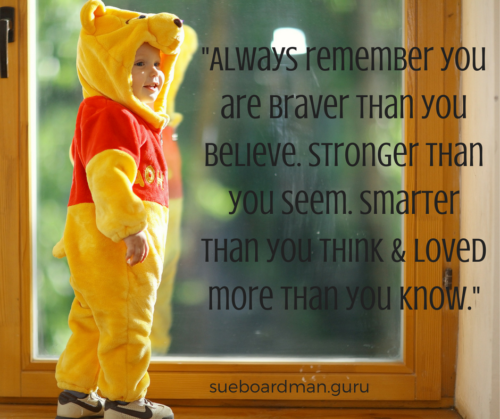The other day, I was chatting with an old friend about the challenges of our childhoods.
About the stories we learned from well-meaning parents in a world new to parenting manuals.
And about how ingrained those stories can become in young children who conclude, without benefit of abstract thought, that pleasing the tall people keeps them from starving and makes the sun come up in the morning.
And ultimately about how, 40 or 50 or 60 years later, some of those stories about self and life may not be working too well.
Somewhere during that conversation, a thought popped into my mind, rather like the missing piece of a puzzle.
Many of us were raised to survive, but not necessarily to thrive.
It makes sense, when you think about it.
We were raised by people who lived through or grew up in the aftermath of the Depression and World War II.
Surviving was a strategy they had to depend on.
And, because they loved us, they passed it on, often not as one possible strategy available to us but as the only strategy.
The difference between surviving and thriving is rather like the difference between living out of scarcity or living out of abundance.
I’m about to wander out to the center of the pond where the ice is thin and suggest that the struggle between the worldviews of surviving -vs- thriving, between scarcity -vs- abundance, may well be one of the biggest challenges in our society at this time.
If you’re still reading…and at all like me…you’re probably wondering how we raise our kids and grandkids and great grandkids and students and even ourselves in the inherent abundance of thriving.
Winnie the Pooh and I have some ideas about that!
Don’t just practice believing that you’re braver, stronger, smarter and loved more than you know… believe that they are, too!
Value them for who they are.
Believe passionately in their capability.
Don’t rescue them from opportunities to learn.
Encourage curiosity. (This means resisting the temptation to solve all their problems and tell them all the answers. All your answers.)
Model What might happen if… exploring.
Invest more in art supplies than “devices”.
Value process, and learning, over outcome.
And, insofar as possible, offer the same grace to yourself!
I hear you. None of these strategies are nearly as efficient as directing and expecting, but we’re talking about our beloveds. The dearest people in our world. Including ourselves!
So, if you’ll hang in there for one more thought, while we’re out in the middle of the pond where the ice is thin, and with apologies to all my clergy and therapist friends, let’s listen for a moment to some words from Carl Jung, via a brilliant author named Gregg Levoy, which I am only beginning to comprehend…
…people rarely integrate anything told to them by others…even those they pay dearly for their advice. “It is the things given them by their own unconscious that make a lasting impression.”
Now, on the off-chance that Uncle Carl was right, the way we move from surviving to thriving, from scarcity to abundance, is to engage experiences that counter our old, limiting beliefs, whether we’re six or sixty!
Look on the faces of the people with whom you share this world and experiment with believing this…
And, just in case you’re up for more… check out Gregg Levoy’s fabulous book, Callings… Finding and Following an Authentic Life.
Or maybe even my Grandmothers Are In Charge Of Hope !
Let me know how it goes!

